- Home
- Carolyn Wells
The Curved Blades Page 2
The Curved Blades Read online
Page 2
II A CLASH OF TONGUES
True to its reputation for calming the impulses of the turbulent spirit,the music soothed Miss Carrington's ruffled temper, and she waxed amiableand even gay. Enthroned on her favorite red velvet chair, resplendent inan elaborately decorated gown of sapphire blue satin, with her brightauburn locks piled high and topped by an enormous comb of carvedtortoise-shell, she dominated the little group and gave orders that mustbe obeyed.
She wore, among other jewels, a magnificent rope of pearls. So remarkablewere these, that the Count, who had never seen them before, ventured torefer to them.
"Yes," agreed Miss Carrington, "they are wonderful. Practicallypriceless, I assure you. It took my agent years to collect them."
"And you grace an informal home evening with these regal gems?"
"Not usually, no. But you know, Count Charlier, pearls must be wornfrequently to preserve their lustre. Laid away a long time, they growdead and dull-looking."
"You keep them here? Is it safe, think you?"
"I don't keep them here all the time. Indeed, I got these from the SafeDeposit only this morning. I shall return them there in a few days. Whilehere, I shall wear them all I can to liven them up."
"You brought a lot of your other jewels, didn't you, Aunt Lucy?" saidPauline, casually; "why did you? Are you going to a ball?"
"No: I wish to--to look them over and plan to have some reset."
"But are they safe?" inquired the Count again; "do you not fear thieves?"
"No, we never have such things as robbery in Merivale Park. It is aquiet, well-behaved neighborhood."
"But you have a safe?" went on the Count; "you take at least thatprecaution?"
"Oh, yes, I have a safe in my boudoir. There is really no danger. CountCharlier, would you like to hear me sing? Find one of my records, Gray."
Miss Carrington's singing voice had been a fine one and was still fair.She sometimes amused herself by making records for her phonograph, andGray Haviland managed the mechanical part of it.
"Which one, Lady Lucy?" he asked, as he rummaged in the record cabinet.
"Any of those pretty love songs," and Miss Carrington glanced coyly atthe Count.
"Here's a fine one," and Haviland placed a disk in the machine.
"Listen," he said, smiling; "don't miss the introduction."
The needle touched the record, and Miss Lucy's laugh rang out, so clearand true, it was difficult to believe it was a recorded laugh and not asound from the lady herself. Then the recorded voice said: "This song isone of Carr's favorites, I'll sing it for him." And then, with only a fewseconds' interval, Miss Carrington's voice sang, "Believe me, if allthose endearing young charms."
It was well sung, and a perfect record, so that the incident of thesinger listening to her own voice was interesting in itself.
"Capital!" applauded the Count, as it was finished. "It is indeedpleasant to preserve one's songs thus. May I not some time record my ownamateur attempt?"
"Delighted to have you, Count," said Haviland, cordially. "Come over somemorning, and we'll do up a lot of records."
"Since when have you been master here, Gray?" said Miss Lucy, with finescorn. "I will give the invitations to my own house, if you please! CountCharlier, if you will come to-morrow afternoon I will instruct Mr.Haviland to make the records."
It was not so much the words as the manner of their utterance that wasoffensive, and Haviland set his lips in stifled anger. It was not at allunusual, this sort of rebuff, but he could not endure it as patiently asthe two girls did. Haviland was a second cousin of Miss Carrington, and,while he lived with her in the capacity of a business secretary andgeneral man of affairs, the post was a sinecure, for the services of herlawyer and of her social secretary left little for Haviland to do. Hissalary was a generous one and he was substantially remembered in herwill, but he sometimes thought the annoying and irritating fleers he hadto accept smilingly, were worth more than he was receiving. He wascontinually made to feel himself a dependent and an inferior.
These trials also fell to the lot of the two girls. Pauline, although heraunt's heiress to the extent of half the fortune, the other half to go toan absent cousin, was by no means treated as an equal of Miss Carringtonherself. It seemed to give the elder lady delight to domineer over herniece and in every possible way make her life uneasy and uncomfortable.As to the social secretary, Miss Frayne, she was scolded for everythingshe did, right or wrong.
Often had the three young people declared intentions of leaving GardenSteps, but so far none of them had made good the threat.
Vanity was the key-note of Lucy Carrington's nature, and, knowing this,they could, if they chose, keep her fairly sweet-tempered by inordinateflattery often administered. This proceeding hurt their self-respect,jarred their tempers, and galled their very souls, but it was that ordismissal, and thus far they had stayed. Matters were nearing a crisis,however, and Haviland's patience was so sorely strained that he wassecretly looking for another position. Anita Frayne, whose pretty blondedoll-face belied a very fiery disposition, was on the verge of a seriousbreak with her employer, and Pauline Stuart continually assured herselfthat she could not go on this way.
Pauline was the orphaned daughter of Lucy's sister, and had lived withher aunt for many years. Carrington Loria, the son of another sister, wasengaged in antiquarian research in Egypt, where he had been since hisgraduation as an engineer. He, too, was an orphan and had lived with Lucyin his younger days, and he and Pauline were equal heirs to their aunt'swealth.
The father of the three Carrington sisters, having become angered at histwo daughters who married against his wishes, had left his entire fortuneto Lucy, his only remaining child. Thus her niece and nephew were heronly direct heirs, and, save for some comparatively small bequests, theCarrington estate would eventually be theirs.
Pauline well knew that if she left her aunt's roof it meant completedisinheritance, for Lucy Carrington was proud of her beautiful niece,and, too, was fond of her in her own way. But the ungovernable temper ofthe lady made her home an almost unbearable abiding-place.
Since childhood years Carrington Loria had lived there only during hiscollege vacations; but had been back occasionally for short visits fromhis now permanent Egyptian occupation. He had always come laden withgifts of Oriental products, and the rooms at Garden Steps showed manyrare specimens of cunning handiwork and rich fabrics and embroideries.
To break the awkward pause that followed Miss Carrington's rude speech toGray Haviland, Pauline picked up an antique scarab from a side table anddrew the Count's attention to its inscription.
He expressed a polite interest, but cast furtive glances at his hostess,as if afraid of a further outbreak.
Nor were his fears unjustified. Miss Carrington administered a scathingreproach to Pauline for intruding herself upon the Count's attention, andbade her put aside the scarab and hold her tongue.
"Don't speak to me like that, Aunt Lucy; I am not a child!" And Pauline,unable to control herself longer, faced her angry aunt with an air ofrighteous wrath.
"I'll speak to you as I choose, miss! It is for you to mend your tone inaddressing me! If you don't, you may have cause to regret it. CountCharlier came here to see me, and I refuse to countenance your clumsyattempts to engage his interest in your silly babble!"
"But--I insist--" stammered the greatly embarrassed Count, "allow me,madame, let me say, I call on you all--all----"
"Nothing of the sort!" declared Miss Lucy; "you came, Count, to playbridge with us. Our opponents behaved so rudely and played so badly itwas impossible for us to continue the game. Nor can we enjoy music inthis inharmonious atmosphere. Let us stroll in the conservatory, you andI."
She rose, trailing her heavy silks and flashing her sparkling jewels, andthe Count, a little hesitatingly, followed her. They crossed the greathall, and, going through a reception room and the delightful sun-parlor,came to the warm, heavily-sce
nted conservatory.
"Poor old Charlier!" said Haviland, as the pair disappeared; "he's in forit now! Do you suppose the palms and orchids will bring him up to thescratch? 'Nita, I'll bet you a box of gloves against a box of simplelittle cigarettes that he doesn't propose to the lady to-night?"
"Done!" cried Miss Frayne, who was sparkling again, now that the dreadpresence was removed. "I doubt he can help himself. She has him at hermercy. And he's too good-mannered to disappoint her wish."
"He'll propose," said Pauline, with an air of conviction. "He's a typicalfortune-hunter, that man. Indeed, I am not sure he's a Count at all. Doyou know, Mr. Illsley?"
"I know almost nothing of the man, save that he's a guest of theFrothinghams. That's not entirely in his favor, I think."
"Right you are!" agreed Haviland. "Those people are,--well, they're to bequeried. But I say, Polly, if the two do hit it off, it's grindingpoverty for us, eh?"
"It may be a blessed relief, Gray. She'll give us something, of course,and send us away from here. I, for one, shouldn't be sorry to go. She isgetting too impossible!"
"She is!" put in Anita; "every day she pounds us worse! I'd like to killher!"
The fierce words and would-be menacing glance of the little blonde beautywere about as convincing as a kitten declaring himself a war lord, andeven the stately Pauline smiled at the picture.
"She ought to be killed," declared Haviland, "and I say thisdispassionately. I wouldn't do it, because killing is not in my line, butthe eternal fitness of things requires her removal to another sphere ofusefulness. She makes life a burden to three perfectly good people, andsome several servants. Not one would mourn her, and----"
"Oh, stop, Gray!" cried Pauline; "don't talk in that strain! Don't listento him, Mr. Illsley. He often says such things, but he doesn't mean them.Mr. Haviland loves to talk at random, to make a sensational hearing."
"Nothing of the sort, Polly. I do mean it. Lucy Carrington is a miserydispenser, and such are not wanted in this nice little old world."
"But perhaps," Pauline looked thoughtful, "the fault is in us. We don'tlike her, and so we see nothing good in what she does. Now, CarringtonLoria adores her. She had a letter from him to-day----"
"Yes, Loria adores her!" interrupted Haviland, "because he doesn't livewith her! She sends him love-letters and money, and he doesn't know theeverlasting torture of living under her roof, year in and year out! Buthe caught on a little the last time he was here. He said,--well, in hisquaint Oriental fashion, he said, 'Gee! she's the limit!' that's what hesaid."
"Well, she is," pouted Anita. "I can't do a thing to suit her. To-day Iwrote a letter over six times before she was satisfied. And every changeshe wanted made was so foolish she wanted it changed back again. Shenearly drove me crazy!"
"But I have to put up with her morning, noon, and night," sighed Pauline."You have your hours off, Anita, but I never do. She even wakens me inthe night to read to her, or to help her plan her new gowns."
"It is awfully hard for you," began Mr. Illsley, and then all stoppedshort, for the object of their discussion returned to the room.
It was plain to be seen Miss Carrington was in a state of suppressedexcitement. She giggled almost hysterically, and tapped the Countplayfully on the arm with her fan, as she bade him say good-night and go.
The interested ones watching her could not learn whether the Count haddeclared himself or not. The presumption was negative, for, had he doneso, surely Miss Carrington would have told the good news.
Charlier himself was distinctly non-committal. Debonair as always, hemade his adieux, no more demonstrative to his hostess than to the others,and went away. Illsley followed, and the household dispersed. The clockstruck midnight as the ladies went upstairs.
Following custom, they all three went to Miss Lucy's boudoir. It was byway of reporting for to-morrow's orders, and was a duty never neglected.
The exquisite apartment, from which opened the bedroom and bath, wassoftly lighted and fragrant with flowers.
"How do you like Count Henri Charlier?" Miss Carrington quickly demandedof her satellites.
"Charming," said the voluble Anita. "Just a typical French nobleman,isn't he? And how he adores our Lady Lucy!"
The whole speech rang false, but the vanity of the lady addressedswallowed it as truest sincerity. "Yes," she returned, "he is infatuated,I have reason to think. But--we shall see what we shall see! Curb yourimpatience, girls! You shall know all in due time."
"Can I do anything for you, Auntie, to-night or to-morrow?" askedPauline, and, though she tried to speak with enthusiasm, her tone didsound perfunctory.
"Not if you offer in that manner," and Miss Carrington looked at herniece coldly. "One would think, Pauline, that it must be an irksome taskto do the smallest favor for your aunt and benefactor! Do you feel nopleasure in doing what trifles you can for one who does everything foryou?"
"I would feel a pleasure, Aunt Lucy, if you were kinder to me. But----"
"Kinder!" shrieked her aunt; "kinder! Girl, have you taken leave of yoursenses? I give you a home, fine dresses, money, everything you can want,and you ask me to be kinder to you! Go! never let me see you again, afterthat speech!"
"Oh, auntie, don't! I didn't mean----"
"You didn't mean to exasperate me beyond endurance? No, of course youmeant to stop short of that! But you have done it. I mean this, Pauline:to-morrow you go elsewhere to live. No longer will I give a home to sucha monster of ingratitude!"
"But, Miss Carrington"--and Anita Frayne's soft voice imploredgently----"don't be hasty. Pauline didn't mean----"
"What!" and Lucy Carrington turned on her, "you take her part? Then yougo, too! I want no ingrates here. Leave me, both of you. This night isyour last beneath this roof! You are two unworthy girls, to scorn andslight the hand that has fed and clothed you and given you luxury andcomfort such as you will never see again! Go, I've done with you! Send meEstelle. She, at least, has some small affection for me."
The two girls left the room. The scene was not without precedent. Beforethis they had been ordered to leave the house forever, but alwaysforgiveness and reinstatement had followed. This time, however, the LadyLucy had been rather more in earnest, and the girls looked at each otheruncertainly as they turned toward their rooms.
Anita summoned Estelle, the French maid, and then told her to hastenimmediately to Miss Carrington.
"Don't undress me," said the mistress as the maid appeared; "I'm notretiring at once. Get me out of this gown and give me a negligee andslippers."
"Yes, mademoiselle," and Estelle deftly obeyed orders and brought a whiteboudoir gown edged with swans-down.
"Not that!" cried Miss Carrington. "Bring the gold-embroidered one,--theOriental."
"Ah, the green one, from Monsieur Loria?"
"Yes, the one my nephew sent me at Christmas time. My, but it's handsome,isn't it, Estelle?"
"Gorgeous!" declared the maid, and she spoke truly. Young Loria knew hisaunt's taste, and he had sent her a typical Egyptian robe, of pale greensilk, heavy with gold embroideries. In it Miss Carrington looked like oneattired for a masquerade.
"Shall I take down mademoiselle's hair?" asked Estelle, lingering.
"No. I want to be alone. I will read awhile. You need not return. I willdo for myself."
"There is your glass of milk, ma'mzelle, on the bed-table."
"Silly! I suppose I can see it for myself."
"Yes, ma'am. And you will have your tea at eight in the morning?"
"Of course, my tea at eight. As always. You might remember that muchyourself. But nobody remembers things for _my_ comfort."
"Pardon, but sometimes it is eight, and, again, it must be half-past."
"Eight! Now, will you go? You are most exasperating! Why do you standthere like a gibbering idiot?"
"The jewels, mademoiselle; the pearls? Shall I not put them in safety?"
"No! I will put them in the safe myself. Where is the key?"
"There, ma
demoiselle, on your dresser. But if I might----"
"You mayn't do anything except to get out and stay out! Do you hear?Shall I never be obeyed?"
"Yes, mademoiselle; good-night."
The soft tone was fully belied by the evil glare of the French girl'seyes, but that was not seen by Miss Lucy Carrington.

 The Deep Lake Mystery
The Deep Lake Mystery The Man Who Fell Through the Earth
The Man Who Fell Through the Earth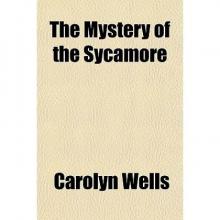 The Mystery of the Sycamore
The Mystery of the Sycamore The Mystery Girl
The Mystery Girl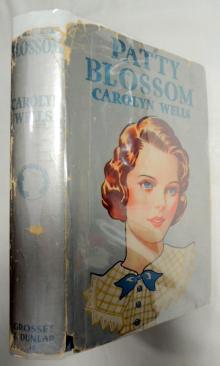 Patty Blossom
Patty Blossom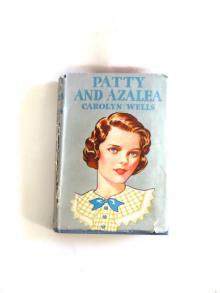 Patty and Azalea
Patty and Azalea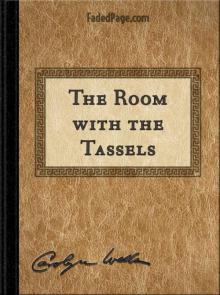 The Room with the Tassels
The Room with the Tassels The Vanishing of Betty Varian
The Vanishing of Betty Varian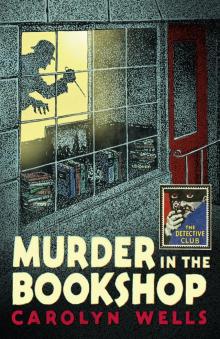 Murder in the Bookshop
Murder in the Bookshop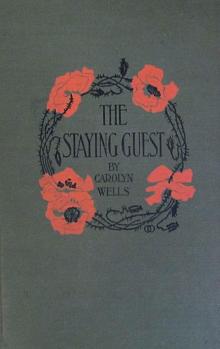 The Staying Guest
The Staying Guest The Curved Blades
The Curved Blades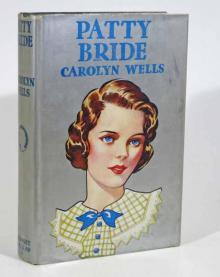 Patty—Bride
Patty—Bride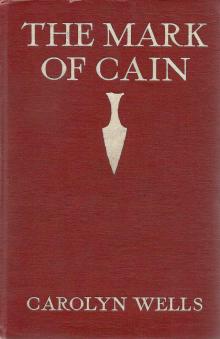 The Mark of Cain
The Mark of Cain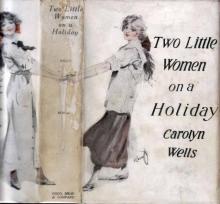 Two Little Women on a Holiday
Two Little Women on a Holiday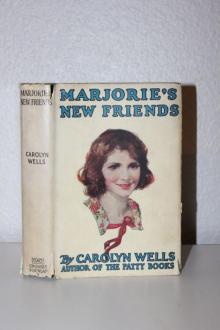 Marjorie's New Friend
Marjorie's New Friend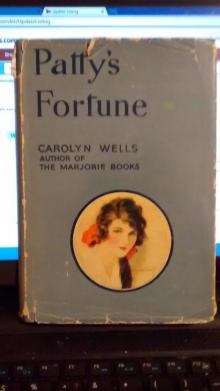 Patty's Fortune
Patty's Fortune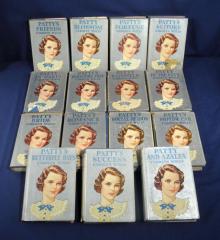 Patty's Social Season
Patty's Social Season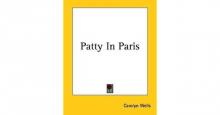 Patty in Paris
Patty in Paris The Diamond Pin
The Diamond Pin The Come Back
The Come Back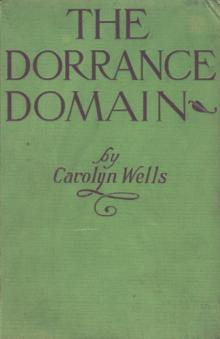 The Dorrance Domain
The Dorrance Domain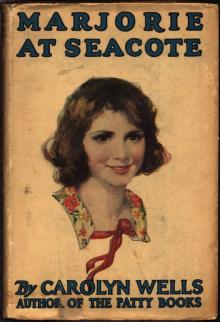 Marjorie at Seacote
Marjorie at Seacote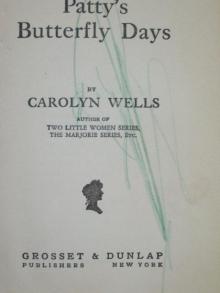 Patty's Butterfly Days
Patty's Butterfly Days Patty's Motor Car
Patty's Motor Car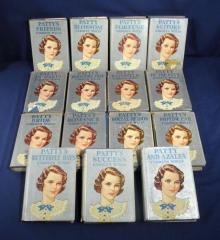 Patty's Success
Patty's Success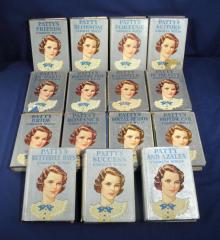 Patty's Suitors
Patty's Suitors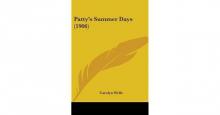 Patty's Summer Days
Patty's Summer Days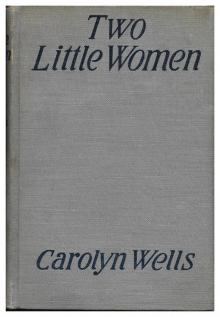 Two Little Women
Two Little Women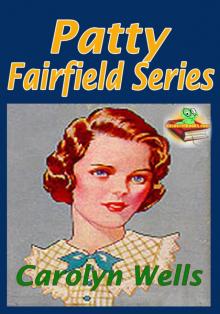 Patty Fairfield
Patty Fairfield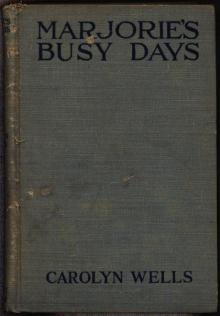 Marjorie's Busy Days
Marjorie's Busy Days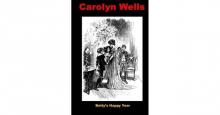 Betty's Happy Year
Betty's Happy Year In the Onyx Lobby
In the Onyx Lobby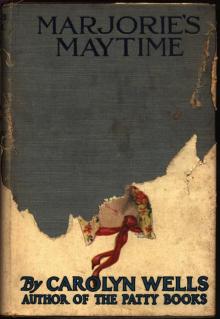 Marjorie's Maytime
Marjorie's Maytime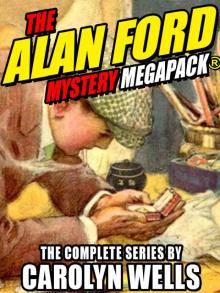 The Alan Ford Mystery MEGAPACK®
The Alan Ford Mystery MEGAPACK® The Gold Bag
The Gold Bag The Clue
The Clue The Gold Bag : A Fleming Stone Mystery
The Gold Bag : A Fleming Stone Mystery